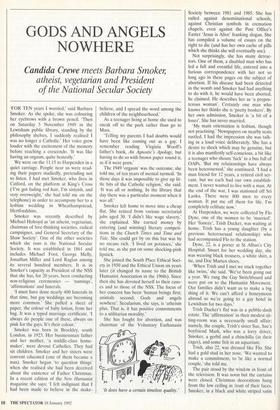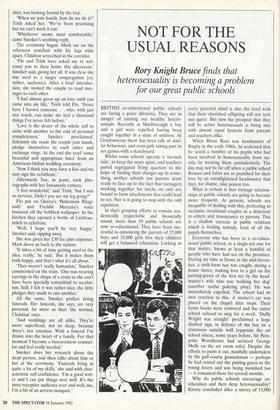GODS AND ANGELS NOWHERE
Candida Crewe meets Barbara Smoker,
atheist, vegetarian and President of the National Secular Society
`FOR TEN years I worried,' said Barbara Smoker. As she spoke, she was colouring her eyebrows with a brown pencil. 'Then on Saturday 5 November 1949 in the Lewisham public library, standing by the philosophy shelves, I suddenly realised I was no longer a Catholic.' Her voice grew louder with the excitement of the memory before reaching a crescendo. 'It was like having an orgasm, quite honestly.'
We were on the 11.15 to Harpenden in a quiet carriage. People near us were read- ing their papers studiedly, pretending not to listen. I had met Smoker, who lives in Catford, on the platform at King's Cross (`I've got fading red hair, I'm sixtyish, and very overweight,' she had told me on the telephone) in order to accompany her to a lesbian wedding in Wheathampstead, Hertfordshire.
Smoker was recently described by Michael Holroyd as 'an atheist, vegetarian, chairman of free-thinking societies, radical campaigner, and General Secretary of the Shaw Society'. One of the other societies which she runs is the National Secular Society. It was established in 1861 and includes Michael Foot, George Melly, Jonathan Miller and Lord Raglan among its several hundred members. It is in Smoker's capacity as President of the NSS that she has, for 20 years, been conducting non-religious ceremonies — `namings', `affirmations' and funerals.
'I must have done nearly 400 funerals in that time, but gay weddings are becoming more common.' She pulled a sheet of paper, the colour of baby lotion, from her bag. It was a typed marriage certificate. 'I always do people one of these, always on pink for the gays. It's their colour.'
Smoker was born in Brockley, south London, in 1923. Her businessman father and her mother, 'a middle-class home- maker', were devout Catholics. They had six children. Smoker and her sisters were convent educated (one of them became a nun). Smoker began `to question things' when she realised she had been deceived about the existence of Father Christmas.
In a recent edition of the New Humanist magazine she says: 'I felt indignant that I had been made to believe in the make-
believe, and I spread the word among the children of the neighbourhood.'
As a teenager living at home she used to sneak off to the park rather than go to Mass.
`Telling my parents I had doubts would have been like coming out as a gay. I remember reading Virginia Woolf's father's book, An Agnostic's Apology, but having to do so with brown paper round it, as if it were porn.'
The 1949 'orgasm' was the outcome, she told me, of ten years of mental turmoil. 'In those days it was impossible to give up lit- tle bits of the Catholic religion,' she said. `It was all or nothing. In the library that day there was a particular moment when it was all.'
Smoker left home to move into a cheap flat. She retired from various secretarial jobs aged 30. 'I didn't like wage slavery,' she explained. She earned money by entering (and winning) literary competi- tions in the Church Times and Time and Tide. She could get by on this but was by no means rich. 'I lived on potatoes,' she told me, as she put on some shocking-pink lipstick.
She joined the South Place Ethical Soci- ety in 1950 and the Ethical Union six years later (it changed its name to the British Humanist Association in the 1960s). Since then she has devoted herself to their caus- es and to those of the NSS. The focus of her concern has been 'human beings first; animals second; Gods and angels nowhere'. Secularism, she says, is 'atheism plus. That is, it has positive commitments to a utilitarian morality.'
She has fought for abortion, and was chairman of the Voluntary Euthanasia 'It does have a certain timeless quality.' Society between 1981 and 1985. She has railed against denominational schools, against Christian symbols in cremation chapels, even against the Post Office's Easter 'Jesus is Alive' franking slogan. She has compiled a volume of essays on the right to die (and has her own cache of pills which she thinks she will eventually use).
Not surprisingly, she has many detrac- tors. One of them, a disabled man who has led a full and eventful life, entered into a furious correspondence with her not so long ago in these pages on the subject of abortion. If his disease had been detected in the womb and Smoker had had anything to do with it, he would have been aborted, he claimed. He describes her as 'a prepos- terous woman'. Certainly one man who knows her thinks she is 'pretty bonkers'. By her own admission, Smoker is 'a bit of a loner'. She has never married.
`My main orientation is lesbian, though not practising.' Newspapers on nearby seats rustled. I had the impression she was talk- ing in a loud voice deliberately. She has a desire to shock which may be genuine, but it is also manifestly self-conscious, a bit like a teenager who shouts 'fuck' in a bus full of OAPs. 'But my relationships have always been heterosexual,' she continued. 'I had a man friend for 12 years, a retired civil ser- vant, but we each had our own establish- ment. I never wanted to live with a man. At the end of the war, I was stationed off Sri Lanka. There were 800 men to every woman. It put me off them for life. I'm completely celibate now.'
At Harpenden, we were collected by Flo Dyne, one of the women to be 'married'.
Her 'fiancée', Trish Ducker, was waiting at home. Trish has a young daughter (by a previous heterosexual relationship) who had accompanied Flo to the station.
Dyne, 22, is a porter at St Alban's City Hospital. Smart for her wedding day, she was wearing black trousers, a white shirt, a tie, and Doc Marten shoes.
`When Trish and I met we stuck together like twins,' she said. 'We've been going out a year. We rang the Gay Switchboard and were put on to the Humanist Movement. Our families didn't want us to make a big
thing of it. We can't afford a honeymoon abroad so we're going to a gay hotel in Lewisham for two days.'
Trish Ducker's flat was in a pebble-dash estate. The 'affirmation' in their modest sit- ting-room was a necessarily small affair: namely, the couple, Trish's sister Sue, Sue's boyfriend Mark, who was a lorry driver, Smoker, a gerbil and a chinchilla (in their cages), and some fish in an aquarium.
Trish, also 22, was dressed like Flo. She had a gold stud in her nose. 'We wanted to make a commitment, to be like a normal couple,' she told me.
The pair stood by the window in front of the television. It was noon but the curtains
were closed. Christmas decorations hung from the low ceiling in front of their faces. Smoker, in a black and white striped satin shirt, was looking formal by the tree.
`When we join hands, how do we do it?' Trish asked her. 'We've been practising but we can't work it out.'
`Whichever seems most comfortable,' came Smoker's soothing reply.
The ceremony began. Mark sat on the velveteen armchair with his legs wide apart. Children screeched in the corridor. `Flo and Trish have asked me to wel- come you to their home this afternoon,' Smoker said, giving her all. It was clear she was used to a larger congregation (or, rather, audience). After a brief introduc- tion, she invited the couple to read mes- sages to each other.
'I had almost given up on love until you came into my life,' Trish told Flo. 'Never have I known someone . . . who, with just one touch, can make me feel a thousand things I've never felt before.'
`Love is the desire of the whole self to unite with another to the end of personal completeness,' Smoker proclaimed. Solemnly she made the couple join hands, pledge themselves to each other and exchange rings. At the end she read 'some beautiful and appropriate lines' from an American-Indian wedding ceremony.
`Now I think you may have a kiss and we may sign the certificate.'
Afterwards Sue, in jeans, took pho- tographs with her Instamatic camera.
'I feel wonderful,' said Trish, 'but I was so nervous. Didn't you see my leg going?'
Flo put on Queen's 'Bohemian Rhap- sody' and Freddie Mercury's voice bounced off the bobbled wallpaper. In the kitchen they opened a bottle of Liebfrau- milch to celebrate.
'Well, I hope you'll be very happy,' Smoker said, sipping away.
She was given her £30 fee plus expenses. Mark drove us back to the station.
'It takes a bit of time getting used to the idea, really,' he said. 'But it makes them both happy, and that's what it's all about.'
'They weren't really humanists,' Smoker commented on the train. 'One was wearing earrings in the shape of a cross so she can't have been specially committed to secular- ism. Still, I felt it was rather nice, the little pledges they made to one another.'
All the same, Smoker prefers doing funerals. Her funerals, she says, are very personal, far more so than 'the normal, Christian' ones.
'And weddings are all alike. They're more superficial, not so deep, because there's less emotion. With a funeral I'm drawn into the heart of a family. For that moment I become a bereavement counsel- lor and feel really needed.'
Smoker does her research about the dead person, and then talks about him or her at the ceremony. 'Funerals bring in quite a lot of my skills,' she said with char- acteristic self-confidence. 'I'm a good writ- er and I can put things over well. It's the most receptive audience ever and well, me, I'm a bit of an actress manquee:



















































 Previous page
Previous page